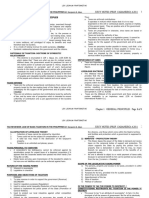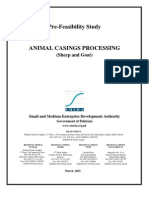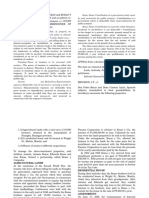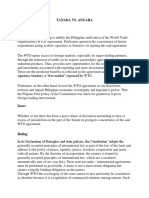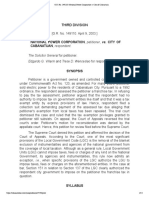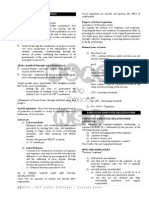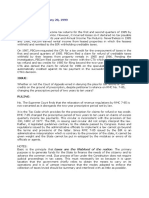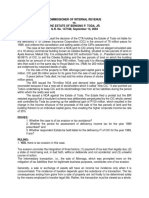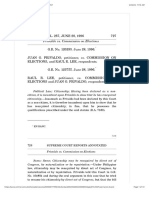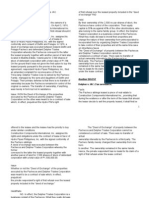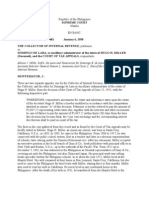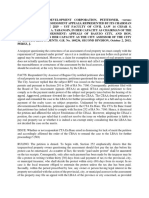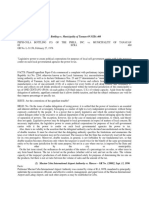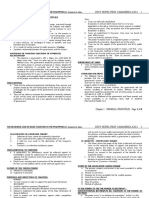Law On Taxation Review.-Chapter 1
Law On Taxation Review.-Chapter 1
Uploaded by
GeeanCopyright:
Available Formats
Law On Taxation Review.-Chapter 1
Law On Taxation Review.-Chapter 1
Uploaded by
GeeanOriginal Description:
Original Title
Copyright
Available Formats
Share this document
Did you find this document useful?
Is this content inappropriate?
Copyright:
Available Formats
Law On Taxation Review.-Chapter 1
Law On Taxation Review.-Chapter 1
Uploaded by
GeeanCopyright:
Available Formats
Second
Taxation Law Review Semester 2020
Law on Taxation Review
Chapter 1: GENERAL PRINCIPLES
TAXATION DEFINED
Taxation is the inherent power of the sovereign, exercised through
the legislature, to impose burdens upon the subjects and objects
within its jurisdiction, for the purpose of raising revenues to carry out
the legitimate objects of the government.
It is also defined as the act of levying a tax, i.e. the process or
means by which the sovereign, through its law-making body, raises
income to defray the necessary expenses of government. It is a
method of apportioning the cost of government among those who, in
some measure, are privileged to enjoy its benefits and must
therefore bear its burdens.
It is a mode of raising revenue for public purposes, (Cooley)
Symbiotic relationship between the government and the citizens.
RATIONALE OF TAXATION: DOCTRINE OF SYMBIOTIC RELATIONSHIP
This doctrine is enunciated in CIR v. Algue, Inc. [158 SCRA 9], which
states that “Taxes are what we pay for civilized society. Without
taxes, the government would be paralyzed for lack of the motive
power to activate and operate it. Hence, despite the natural
reluctance to surrender part of one’s hard-earned income to the
taxing authorities, every person who is able must contribute his
share in the burden of running the government. The government for
its part, is expected to respond in the form of tangible and
intangible benefits intended to improve the lives of the people and
enhance their material and moral values.”
TAXES DEFINED
Taxes are the enforced proportional contributions from persons and
property levied by the law-making body of the State by virtue of its
sovereignty for the support of the government and all public needs,
[Cooley]
They are not arbitrary exactions but contributions levied by authority
of law, and by some rule of proportion which is intended to ensure
Microsof| Chapter 1: General Principles 1
Second
Taxation Law Review Semester 2020
uniformity of contribution and a just apportionment of the burdens of
government.
Thus:
a. Taxes are enforced contributions
It operates in invitum which means that it is in no way dependent
on the will or contractual assent, express or implied, of the
person taxed. They are positive acts of the government
(Rochester vs. Bloss ).
b. Taxes are proportional in character, since taxes are based on
one’s ability to pay.
c. Taxes are levied by authority of law.
The power to impose taxes is a legislative power; it cannot be
imposed by the executive department nor by the courts.
d. Taxes are for the support of the government and all its public
needs.
e. Taxes are pecuniary burden payable in money, such that a tax is
not necessarily confined to those payable in money (e.g. a
backpay cert may be used to pay real estate taxes).
f. Taxes are imposed by the State on persons, property or services
within its jurisdiction.
IMPORTANCE OF TAXES
• Taxes are important because they the lifeblood of the government
and so should be calculated without unnecessary hindrance (CIR vs
Algue).
LIFEBLOOD DOCTRINE
• The lifeblood theory constitutes the theory of taxation, which
provides that the existence of government is a necessity; that
government cannot continue without means to pay its expenses;
and that for these means it has a right to compel its citizens and
property within its limits to contribute.
• Without revenue raised from taxation, the government will not
survive, resulting in detriment to society. Without taxes, the
government would be paralyzed for lack of motive power to activate
and operate it. (CIR vs. ALGUE)
Microsof| Chapter 1: General Principles 2
Second
Taxation Law Review Semester 2020
• Taxes are the lifeblood of the government and there prompt and
certain availability is an imperious need. (CIR vs Goodrich
International Rubber Co.)
ILLUSTRATION OF LIFEBLOOD THEORY
1. Collection of taxes cannot be enjoined by injunction.
2. Taxes could not be the subject of compensation or set off.
3. A valid tax may result in the destruction of the taxpayer’s
property.
4. Taxation is an unlimited and plenary power.
TAXES, PERSONAL TO TAXPAYER
• A corporation’s tax delinquency cannot be enforced against its
stockholders except for unpaid taxes of a dissolved corporation if it
appears that the corporate assets have passed into their hands (Tan
Tiong Bio vs CIR).
• Estate taxes accruing upon transmission of the decedent’s estate to
his heirs are not liabilities which can be enforced against heirs.
NATURE OF THE TAXING POWER
1) Inherent in sovereignty
2) Legislative in character
PURPOSES AND OBJECTIVES OF TAXATION
PRIMARY
1. To raise revenue in order to support the government (Revenue)
SECONDARY
2. Used for regulatory purposes (Regulation)
3. Used to reduce social inequality (Reduction of Social Inequality)
4. Utilized to implement the police power of the State (Promotion of
General Welfare)
5. Used to protect our local industries against unfair competition
(Protectionism)
6. Utilized by the government to encourage the growth of local
industries (Encourage Economic Growth)
Microsof| Chapter 1: General Principles 3
Second
Taxation Law Review Semester 2020
THEORY AND BASIS OF TAXATION
1) NECESSITY THEORY
• Taxation as stated in the case of Phil. Guaranty Co., Inc. v.
Commissioner [13 SCRA 775], is a power predicated upon
necessity. It is a necessary burden to preserve the State’s
sovereignty and a means to give the citizenry an army to resist
aggression, a navy to defend its shores from invasion, a corps of
civil servants to serve, public improvements for the enjoyment of
the citizenry, and those which come within the State’s territory
and facilities and protection which a government is supposed to
provide.
2) BENEFITS – PROTECTION THEORY
• This theory bases the power of the State to demand and receive
taxes on the reciprocal duties of support and protection. The
citizen supports the State by paying the portion from his property
that is demanded in order that he may, by means thereof, be
secured in the enjoyment of the benefits of an organized society.
• No one is allowed to object to or resist payment of taxes solely
because no personal benefit to him can be pointed out as arising
from the tax, [Lorenzo v. Posadas].
SCOPE OF THE LEGISLATIVE TAXING POWER
1) The persons, property and excises to be taxed, provided it is within
its jurisdiction
2) Amount or rate of tax
3) Purposes for its levy, provided it be for a public purpose
4) Kind of tax to be collected
5) Apportionment of the tax
6) Situs of taxation
7) Method of collection
IS THE POWER TO TAX THE POWER TO DESTROY?
/CONSTITUTIONAL RESTRAINTS RE: TAXATION IS THE POWER TO
DESTROY
• The power to tax "is an attribute of sovereignty". In fact, it is the
strongest of all the powers of government. But for all its
plenitude, the power to tax is not unconfined as there are
restrictions. Adversely effecting as it does property rights, both
Microsof| Chapter 1: General Principles 4
Second
Taxation Law Review Semester 2020
the due process and equal protection clauses of the Constitution
may properly be invoked to invalidate in appropriate cases of a
revenue measure. If it were otherwise, there would be truth to
the 1903 dictum of Chief Justice Marshall that "the power to tax
involves the power to destroy." The web or unreality spun from
Marshall's famous dictum was brushed away by one stroke of Mr.
Justice Holmes' pen, thus: "The power to tax is not the power to
destroy while this Court sits." "So it is in the Philippines." It is
because of the constitutional restraints placed on a taxing power
that violates fundamental rights.
• The power to tax includes the power to destroy if it is used as an
implement of the police power (regulatory) of the State.
However, it does not include the power to destroy if it is used
solely for the purpose of raising revenue. (ROXAS vs. CTA)
• If the purpose of taxation is regulatory in character, taxation is
used to implement the police power of the state
• If the power of taxation is used to destroy things, businesses, or
enterprises and the purpose is to raise revenue, the court will
come in because there will be violation of the inherent and
constitutional limitations and it will be declared invalid.
POWER OF JUDICIAL REVIEW IN TAXATION
• Courts cannot inquire into the wisdom of a taxing act. (CIR vs
Lingayen Gulf Electric Power Co)
• Court’s power in taxation is limited only to the application and
interpretation of the law.
• It is not within the province of the court to inquire into the
wisdom of the law for indeed courts are bound by the words in
the mouth of the lawmaker. “A verbo legis non est recedendum”
(Commissioner of Customs vs Manila Star Ferry inc.)
BASIC PRINCIPLE OF A SOUND TAX SYSTEM
1) FISCAL ADEQUACY
• The sources of revenues must be adequate to meet government
expenditures. (Chavez v. Ongpin, 186 SCRA 331).
• Even if a tax law violates the principle of Fiscal Adequacy and the
proceeds may not be sufficient to satisfy the needs of the
government, still the tax law is valid
2) THEORETICAL JUSTICE
• The tax burden should be in proportion to the taxpayers
ability to pay (ABILITY TO PAY PRINCIPLE)
Microsof| Chapter 1: General Principles 5
Second
Taxation Law Review Semester 2020
• Equitable taxation has been mandated by our constitution; as
if taxes are unjust and unreasonable then they are not
equitable, thus invalid.
3) ADMINISTRATIVE FEASIBILITY
• The tax law must be capable of effective or efficient
enforcement.
• There is no law that requires compliance with this principle, so
even if the tax law violates this principle; such tax law is valid.
TAXATION DISTINGUISHED FROM POLICE POWER AND EMINENT
DOMAIN
TAXATION POLICE POWER EMINENT DOMAIN
AS TO For the purpose To promote general For public use
PURPOSE raising revenue welfare
through regulations
AS TO Protection and The maintenance of a Just compensation not to
COMPENSATIO benefits healthy economic exceed the market value
N received from standard of society by the owner or
the (damnum absque administrator or anyone
government. injuria) having legal interest in
property, or determined
by the assessor,
whichever is lower.
AS TO Operate upon community or a class of Operates on the
PERSONS individual property
individuals
AFFECTED owner
AS TO Exercised only by the government or its May be exercised by
AUTHORITY public services corp or
political subdivisions.
WHICH public utilities if
EXERCISES granted by law
THE POWER
AS TO Generally no limit Limited to the cost of There is imposition;
AMOUNT OF to the amount of regulation rather it is the owner o
IMPOSITION tax that may be the property taken who
imposed is paid just
compensation.
AS TO Subject to certain Relatively free from Subject to certain
THE constitutional constitutional constitutional
RELATIONSHIP limitations, limitations and limitations, NOT
TO THE including the superior to the non- including prohibition
CONSTITUTIO prohibition impairment against impairment of
N against provisions the obligation on
impairment of the contracts
obligation of
contracts
AS TO Taxes paid No transfer, but only
TRANSFER become part of restraint on the
OF the public funds exercise, of
PROPERTY property right
RIGHTS exists
Microsof| Chapter 1: General Principles 6
Second
Taxation Law Review Semester 2020
ASPECTS OF TAXATION
1) LEVY or IMPOSITION
• enactment of tax laws
• legislative in character
2) ASSESSMENT
• collection
• administrative in character
TAXES DISTINGUISHED FROM OTHER IMPOSITIONS
1) toll – amount charged for the cost and maintenance of property
used;
2) penalty – punishment for the commission of a crime
3) compromise penalty – amount collected in lieu of criminal
prosecution in cases of tax violations;
4) special assessment – levied only on land based wholly on the
benefit accruing thereon as a result of improvements of public works
undertaken by government within the vicinity.
5) license fee – regulatory imposition in the exercise of the police
power of the State;
6) margin fee – exaction designed to stabilize the currency 7) debt –
a tax is not a debt but is an obligation imposed by law.
8) regulatory fees – exaction designed to regulate industries
9) subsidy – legislative grant of money in aid of a private enterprise
deemed to promote the public welfare.
10) custom duties and fees – duties charged upon commodities
on their being imported into or exported from a country;
11) revenue – broad term that includes not only taxes but income
from other sources as well.
12) Tribute – synonymous with tax
13) Impost – signifies any tax, tribute or duty.
Toll v. Tax
• Toll is a sum of money for the use of something. It is the
consideration which is paid for the use of a road, bridge, or the like,
of a public nature. Taxes, on the other hand, are enforced
proportional contributions from persons and property levied by the
State by virtue of its sovereignty for the support of the government
and all public needs.
• Toll is a demand of proprietorship; tax is a demand of sovereignty.
Microsof| Chapter 1: General Principles 7
Second
Taxation Law Review Semester 2020
• Toll is paid for the use of another’s property; tax is paid for the
support of government.
• The amount paid as toll depends upon the cost of construction or
maintenance of the public improvements used; while there is no
limit on the amount collected as tax as long as it is not excessive
unreasonable, or confiscatory.
• Toll may be imposed by the government or by private individuals or
entities; tax may be imposed only by the government.
Penalty v. Tax
• Penalty is any sanction imposed as a punishment for violation of law
or for acts deemed injurious; taxes are enforced proportional
contributions from persons and property levied by the State by
virtue of its sovereignty for the support of the government and all
public needs.
• Penalty is designed to regulate conduct; taxes are generally
intended to generate revenue.
• Penalty may be imposed by the government or by private
individuals or entities; taxes only by the government.
Special assessment v. Tax
• A special assessment tax is an enforced proportional contribution
from owners of lands especially benefited by public improvements
• A special assessment is levied only on land; tax is imposed on
persons, property and excises.
• A special assessment is not a personal liability of the person
assessed; it is limited to the land.
• A special assessment is based wholly on benefits, not necessity.
• A special assessment is exceptional both as to time and place; a tax
has general application.
Some rules:
• An exemption from taxation does not include exemption from a
special assessment.
• The power to tax carries with it the power to levy a special
assessment.
License fee v. Tax
• PURPOSE: Tax imposed for revenue WHILE license fee for regulation.
Tax for general purposes WHILE license fee for regulatory purposes
only.
Microsof| Chapter 1: General Principles 8
Second
Taxation Law Review Semester 2020
• BASIS: Tax imposed under power of taxation WHILE license fee
under police power.
• AMOUNT: In taxation, no limit as to amount WHILE license fee
limited to cost of the license and expenses of police surveillance and
regulation.
• TIME OF PAYMENT: Taxes normally paid after commencement of
business WHILE LF before.
• EFFECT OF PAYMENT: Failure to pay a tax does not make the
business illegal WHILE failure to pay license fee makes business
illegal.
• SURRENDER: Taxes, being lifeblood of the state, cannot be
surrendered except for lawful consideration WHILE a license fee may
be surrendered with or without consideration.
IMPORTANCE OF DISTINCTION BETWEEN TAXES AND LICENSE
FEES:
Ø It is necessary to determine whether a particular imposition is a
tax or a license fee, because some limitations apply only to one
and not to the other.
Ø Furthermore, exemption from taxes does not include exemption
from license fees
Obligation to pay debt v. obligation to pay tax
• A debt is generally based on contract, express or implied, while a
tax is based on laws.
• A debt is assignable, while a tax cannot generally be assigned.
• A debt may be paid in kind, while a tax is generally paid in money.
• A debt may be the subject of set off or compensation, a tax cannot.
• A person cannot be imprisoned for non-payment of tax, except poll
tax.
• A debt is governed by the ordinary periods of prescription, while a
tax is governed by the special prescriptive periods provided for in
the NIRC.
• A debt draws interest when it is so stipulated or where there is
default, while a tax does not draw interest except only when
delinquent.
TAXES CLASSIFIED
AS TO SUBJECT MATTER OR OBJECT
Microsof| Chapter 1: General Principles 9
Second
Taxation Law Review Semester 2020
1. Personal, poll or capitation tax
Tax of a fixed amount imposed on persons residing within a
specified territory, whether citizens or not, without regard to their
property or the occupation or business in which they may be
engaged, i.e. community tax.
2. Property tax
Tax imposed on property, real or personal, in proportion to its value
or in accordance with some other reasonable method of
apportionment.
3. Excise tax
A charge imposed upon the performance of an act, the enjoyment of
privilege, or the engaging in an occupation.
AS TO PURPOSE
4. General/fiscal revenue tax is that imposed for the purpose of
raising public funds for the service of the government.
5. Special or regulatory tax is imposed primarily for the regulation
of useful or non-useful occupation or enterprises and secondarily
only for the purpose of raising public funds.
AS TO WHO BEARS THE BURDEN
6. Direct tax
A direct tax is demanded from the person who also shoul,ders the
burden of the tax. It is a tax which the taxpayer is directly or
primarily liable and which he or she cannot shift to another.
7. Indirect tax
An indirect tax is demanded from a person in the expectation and
intention that he or she shall indemnify himself or herself at the
expense of another, falling finally upon the ultimate purchaser or
consumer. A tax which the taxpayer can shift to another.
AS TO THE SCOPE OF THE TAX
8. National tax
A national tax is imposed by the national government.
9. Local tax
A local tax is imposed by the municipal corporations or local
government units (LGUs).
AS TO THE DETERMINATION OF AMOUNT
Microsof| Chapter 1: General Principles 10
Second
Taxation Law Review Semester 2020
10. Specific tax
A specific tax is a tax of a fixed amount imposed by the head or
number or by some other standard of weight or measurement. It
requires no assessment other than the listing or classification of the
objects to be taxed.
11. Ad valorem tax
An ad valorem tax is a fixed proportion of the value of the property
with respect to which the tax is assessed. It requires the
intervention of assessors or appraisers to estimate the value of such
property before due from each taxpayer can be determined.
12. Customs Duties
Duties charged upon the commodities on their being imported into
or exported from a country.
AS TO GRADUATION OR RATE
13. Proportional tax
Tax based on a fixed percentage of the amount of the property
receipts or other basis to be taxed. Example: real estate tax.
14. Progressive or graduated tax
Tax the rate of which increases as the tax base or bracket increases.
Digressive tax rate: progressive rate stops at a certain point.
Progression halts at a particular stage.
15. Regressive tax
Tax the rate of which decreases as the tax base or bracket
increases. There is no such tax in the Philippines.
TAXPAYER’S SUIT
• One where a taxpayer who feels aggrieved by the implication of a
tax law goes now via judicial review to the SC and asks for a
nullification of the law.
• In availing judicial review as a taxpayer, the only option one can
look into are the inherent and constitutional limitations on taxation.
• Taxpayers have sufficient interest of preventing the illegal
expenditures of money raised by taxation (NOT DONATIONS AND
CONTRIBUTIONS)
Microsof| Chapter 1: General Principles 11
Second
Taxation Law Review Semester 2020
• A taxpayer is not relieved from the obligation of paying a tax
because of his belief that it is being misappropriated by certain
officials
• A taxpayer has no legal standing to question executive acts that do
not involve the use of public funds. (GONZALES vs. MARCOS)
• It is only when an act complained of which may include a legislative
enactment of a statute, involves the illegal expenditure of public
money that the so-called taxpayers suit may be allowed. LOZADA
vs. COMELEC
• Taxpayers may be levied with a regulatory purpose to provide
means for the rehabilitation and stabilization of a threatened
industry which is affected with the public interest as to be within the
police power of the State. CALTEX vs. COA
• The Supreme Court has discretion whether or not to entertain
taxpayers suit and could brush aside lack of locus standi. KILOS
BAYAN vs. GUINGONA
REQUISITES FOR A TAXPAYERS PETITION
1) That money is being extracted and spent in violation of specific
constitutional protections against abuses of legislative power
2) That public money is being deflected to any improper purpose
3) That the petitioner seeks to restrain respondents from wasting
public funds through the enforcement of an invalid or
unconstitutional law.
CASES:
Commissioner vs. Algue
GRL-28890, 17 February 1988.First Division, Cruz (J); 4 concur
Facts: The Philippine Sugar Estate Development Company (PSEDC)
appointed Algue Inc. as its agent, authorizing it to sell its land, factories,
and oil manufacturing process. The Vegetable Oil Investment Corporation
(VOICP) purchased PSEDC properties. For the sale, Algue received a
commission of P125,000 and it was from this commission that it paid
Guevara, et. al. organizers of the VOICP, P75,000 in promotional fees. In
1965, Algue received an assessment from the Commissioner of Internal
Revenue in the amount of P83, 183.85 as delinquency income tax for
years 1958 amd 1959. Algue filed a protest or request for reconsideration
which was not acted upon by the Bureau of Internal Revenue (BIR). The
counsel for Algue had to accept the warrant of distrant and levy. Algue,
however, filed a petition for review with the Court of Tax Appeals.
Microsof| Chapter 1: General Principles 12
Second
Taxation Law Review Semester 2020
Issue: Whether the assessment was reasonable.
Held: Taxes are the lifeblood of the government and so should be
collected without unnecessary hindrance. Every person who is able to pay
must contribute his share in the running of the government. The
Government, for his part, is expected to respond in the form of tangible
and intangible benefits intended to improve the lives of the people and
enhance their moral and material values. This symbiotic relationship is the
rationale of taxation and should dispel the erroneous notion that is an
arbitrary method of exaction by those in the seat of power. Tax collection,
however, should be made in accordance with law as any arbitrariness will
negate the very reason for government itself. For all the awesome power
of the tax collector, he may still be stopped in his tracks if the taxpayer
can demonstrate that the law has not been observed. Herein, the claimed
deduction (pursuant to Section 30 [a] [1] of the Tax Code and Section 70
[1] of Revenue Regulation
2: as to compensation for personal services) had been legitimately by
Algue Inc. It has further proven that the payment of fees was reasonable
and necessary in light of the efforts exerted by the payees in inducing
investors (in VOICP) to involve themselves in an experimental enterprise
or a business requiring millions of pesos. The assessment was not
reasonable.
Tolentino vs. Secetary of Finance
GR No. 115455. August 25, 1994
Facts: The value-added tax (VAT) is levied on the sale, barter or exchange
of goods and properties as well as on the sale or exchange of services. RA
7716 seeks to widen the tax base of the existing VAT system and enhance
its administration by amending the National Internal Revenue Code. There
are various suits challenging the constitutionality of RA 7716 on various
grounds.
One contention is that RA 7716 did not originate exclusively in the House
of Representatives as required by Art. VI, Sec. 24 of the Constitution,
because it is in fact the result of the consolidation of 2distinct bills, H. No.
11197 and S. No. 1630. There is also a contention that S. No. 1630 did
not pass 3 readings as required by the Constitution.
Issue: Whether or not RA 7716 violates Art. VI, Secs. 24 and 26(2) of the
Constitution.
Held: The argument that RA 7716 did not originate exclusively in the
House of Representatives as required by Art. VI, Sec. 24 of the
Constitution will not bear analysis. To begin with, it is not the law but the
revenue bill which is required by the Constitution to originate exclusively
Microsof| Chapter 1: General Principles 13
Second
Taxation Law Review Semester 2020
in the House of Representatives. To insist that a revenue statute and not
only the bill which initiated the legislative process culminating in the
enactment of the law must substantially be the same as the House bill
would be to deny the Senate’s power not only to concur with amendments
but also to propose amendments. Indeed, what the Constitution simply
means is that the initiative for filing revenue, tariff or tax bills, bills
authorizing an increase of the public debt, private bills and bills of local
application must come from the House of Representatives on the theory
that, elected as they are from the districts, the members of the House can
be expected to be more sensitive to the local needs and problems. Nor
does the Constitution prohibit the filing in the Senate of a substitute bill in
anticipation of its receipt of the bill from the House, so long as action by
the Senate as a body is withheld pending receipt of the House bill.
The next argument of the petitioners was that S. No. 1630 did not pass 3
readings on separate days as required by the Constitution because the
second and third readings were done on the same day. But this was
because the President had certified S. No. 1630 as urgent. The
presidential certification dispensed with the requirement not only of
printing but also that of reading the bill on separate days. That upon the
certification of a bill by the President the requirement of 3 readings on
separate days and of printing and distribution can be dispensed with is
supported by the weight of legislative practice.
EXERCISES:
Discuss the importance of taxes
SUGGESTED ANSWER:
Taxes are the lifeblood of the government, for without taxes, the
government can neither exist nor endure. A principal attribute of
sovereignty, the exercise of taxing power derives its source from the
very existence of the state whose social contract with its citizens obliges
it to promote public interest and common good. The theory behind the
exercise of the power to tax emanates from necessity; without taxes,
government cannot fulfil its mandate of promoting the general welfare
and well-being of the people. (NAPOCOR v. City of Cabanatuan, G.R. No.
149110, April 9, 2003).
Nature of the Power of Taxation (#1, 2000 Bar Exams)
Justice Holmes once said: “The power to tax is not the power to destroy
while this Court (the SC) sits.” Describe the power to tax and its
limitations.
SUGGESTED ANSWER:
Microsof| Chapter 1: General Principles 14
Second
Taxation Law Review Semester 2020
The power to tax is an inherent power of the sovereignty which is
exercised through the legislature to impose burdens upon subjects and
objects within its jurisdiction for the purpose of raising revenues to
carry out the legitimate objects of government. The underlying basis for
its exercise is governmental necessity for without it, no government can
exist nor endure. Accordingly, it has the broadest scope of all the
powers of government because in the absence of limitations, it is
considered an unlimited, plenary, comprehensive and supreme. The two
limitations on the power of taxation are the inherent and
constitutional limitations which are intended to prevent abuse on the
exercise of the otherwise plenary and unlimited power. It is the Court’s
role to see to it that the exercise of the power does not transgress these
limitations.
Power of Taxation: Legislative in Nature (Bar 1994)
The Secretary of Finance, upon recommendation of the Commissioner
of Internal Revenue, issued a Revenue Regulation using gross income
as the tax base for corporations doing business in the Philippines. Is
the Revenue Regulation valid?
SUGGESTED ANSWER:
The regulation establishing gross income as the tax base for
corporations doing business in the Philippines (domestic as well as
resident foreign) is not valid. This is no longer implementation of the
law but actually it constitutes legislation because among the powers
that is exclusively within the legislative authority to tax is the power to
determine -the amount of the tax. (See 1 Cooley 176-184). Certainly, if
the tax is limited to gross income without deductions of these
corporations, this is changing the amount of the tax as said amount
ultimately depends on the taxable base.
Power of Taxation; Inherent in a Sovereign State (2005) Describe
the power of taxation. May a legislative body enact laws to raise
revenues in the absence of a constitutional provision granting said body
the power to tax? Explain.
SUGGESTED ANSWER:
Yes, the legislative body may enact laws even in the absence of a
constitutional provision because the power to tax is inherent in the
government and not merely a constitutional grant. The power of taxation
is an essential and inherent attribute of sovereignty belonging as a
matter of right to every independent government without being
expressly granted by the people. (Pepsi-Cola Bottling Company of the
Philippines, Inc. v. Municipality of Tanauan, Leyte, G.R. No. L-31156)
Microsof| Chapter 1: General Principles 15
Second
Taxation Law Review Semester 2020
Taxation is the inherent power of a State to collect enforced proportional
contribution to support the expenses of government. Taxation is the
power vested in the legislature to impose burdens or charges upon
persons and property in order to raise revenue for public purposes. The
power to tax is so unlimited in force and so searching in extent that
courts scarcely venture to declare it is subject to any restrictions
whatever, except such as rest in the discretion of the authority which
exercises it. (Tio v. Videogram Regulatory Board, G.R. No. L-75697, June
18, 1987) So potent is the power to tax that it was once opined that "the
power to tax involves the power to destroy."(C.J. Marshall in McCulloch v.
Maryland)
Revocation of Exempting Statutes (Bar 1997)
"X" Corporation was the recipient in 1990 of two tax exemptions both
from Congress, one law exempting the company's bond issues from
taxes and the other exempting the company from taxes in the operation
of its public utilities. The two laws extending the tax exemptions were
revoked by Congress before their expiry dates. Were the revocations
constitutional?
SUGGESTED ANSWER:
Yes. The exempting statutes are both granted unilaterally by Congress in
the exercise of taxing powers. Since taxation is the rule and tax
exemption, the exception, any tax exemption unilaterally granted can be
withdrawn at the pleasure of the taxing authority without violating the
Constitution (Mactan Cebu International Airport Authority v, Marcos, G.R
No. 120082, September 11, 1996).
Neither of these were issued by the taxing authority in a contract
lawfully entered by it so that their revocation would not constitute
an impairment of the obligations of contracts.
ALTERNATIVE ANSWER:
No. The withdrawal of the tax exemption amounts to a
deprivation of property without due process of law, hence
unconstitutional.
Microsof| Chapter 1: General Principles 16
Second
Taxation Law Review Semester 2020
Microsof| Chapter 1: General Principles 17
You might also like
- Employee Handbook RestaurantDocument68 pagesEmployee Handbook RestaurantJef S Adam100% (2)
- Accntncy MCQs For SAS CAGDocument12 pagesAccntncy MCQs For SAS CAGDeepak Kumar PandaNo ratings yet
- Income Statement and Cost of Goods Sold Format in ExcelDocument2 pagesIncome Statement and Cost of Goods Sold Format in ExcelReader100% (14)
- 11 x09 Capital BudgetingDocument29 pages11 x09 Capital BudgetingKatherine Cabading Inocando100% (13)
- Acca p7 Workbook With AnswersDocument78 pagesAcca p7 Workbook With AnswersDaedric100% (3)
- Mutuum Case DigestsDocument18 pagesMutuum Case DigestsHaidelyn CapistranoNo ratings yet
- Benjamin Aban - Basic Law On Taxation SummaryDocument99 pagesBenjamin Aban - Basic Law On Taxation Summaryfreegalado86% (7)
- Training Plan: Learning Outcome Learning ResourcesDocument9 pagesTraining Plan: Learning Outcome Learning ResourcesGeeanNo ratings yet
- Mocha Swiss Roll RecipeDocument3 pagesMocha Swiss Roll RecipeGeeanNo ratings yet
- Turnaround PresentationDocument14 pagesTurnaround Presentationmugabelg100% (4)
- Publication 4012Document208 pagesPublication 4012Musafir Hu Yaaro100% (1)
- SMEDA Animal Casings Processing UnitDocument22 pagesSMEDA Animal Casings Processing UnitAg BalochNo ratings yet
- CH 01Document13 pagesCH 01Juan CarlosNo ratings yet
- Chapter 1 - TAXDocument9 pagesChapter 1 - TAXJuliannaMendozaMaleNo ratings yet
- MadrigalDocument468 pagesMadrigalGenelle Mae MadrigalNo ratings yet
- General Principle NotesDocument11 pagesGeneral Principle NotesBar2012No ratings yet
- Case Digests and Reviewer: Taxation 1 (General Taxation) PageDocument98 pagesCase Digests and Reviewer: Taxation 1 (General Taxation) PageAstrid Gopo BrissonNo ratings yet
- Tax 2 Cases - Estate TaxDocument48 pagesTax 2 Cases - Estate TaxRoxanne PeñaNo ratings yet
- Matalin V Mun. Council of MalabangDocument2 pagesMatalin V Mun. Council of MalabangMath DownloaderNo ratings yet
- CIR vs. Efren CastanedaDocument1 pageCIR vs. Efren CastanedaPretzel TsangNo ratings yet
- Roxas Vs CTADocument9 pagesRoxas Vs CTAVincent OngNo ratings yet
- Case Digest Admin Law 2013Document6 pagesCase Digest Admin Law 2013May Anne NaingueNo ratings yet
- CIR Vs ST LukesDocument4 pagesCIR Vs ST LukesJohn Dexter FuentesNo ratings yet
- GR 76778 ChavezDocument2 pagesGR 76778 ChavezNaomi InotNo ratings yet
- X Article IXDocument69 pagesX Article IXAnyaNo ratings yet
- 1EDocument11 pages1EDevilleres Eliza DenNo ratings yet
- Beda Tax ReviewerDocument68 pagesBeda Tax ReviewerAnonymous 40zhRk1No ratings yet
- PAL Vs EDUDocument1 pagePAL Vs EDUBob LawNo ratings yet
- 11 Lorenzo v. Posadas G.R. No. 43082 (1937)Document5 pages11 Lorenzo v. Posadas G.R. No. 43082 (1937)Angelie ManingasNo ratings yet
- I. INTRODUCTION - Concepts and Principles A. Public Office and Public Officers 1) DefinitionsDocument10 pagesI. INTRODUCTION - Concepts and Principles A. Public Office and Public Officers 1) DefinitionsLara Michelle Sanday BinudinNo ratings yet
- Tiu VS CaDocument2 pagesTiu VS CaChickoy RamirezNo ratings yet
- 5 - Divine Word University of Tacloban Vs Secretary of Labor and Employment and Divine Word University Employees UNIONALU CONSOLIDATEDDocument15 pages5 - Divine Word University of Tacloban Vs Secretary of Labor and Employment and Divine Word University Employees UNIONALU CONSOLIDATEDGoodyNo ratings yet
- Davao Light vs. CA - AguilarDocument1 pageDavao Light vs. CA - AguilarLexa ClarkeNo ratings yet
- Torts and DamagesDocument15 pagesTorts and DamagesSteven TylerNo ratings yet
- Labstan TranscriptionsDocument36 pagesLabstan Transcriptionsjade123_129No ratings yet
- Transpo Law Chap 10 and 11Document5 pagesTranspo Law Chap 10 and 11biburaNo ratings yet
- ABS CBN V CTA Exception To The Rule On Erroneous Executive ConstructionDocument2 pagesABS CBN V CTA Exception To The Rule On Erroneous Executive ConstructionprincessmagpatocNo ratings yet
- Tax Digest 51 55Document11 pagesTax Digest 51 55glaiNo ratings yet
- 13 - Sison v. Ancheta - SaleDocument2 pages13 - Sison v. Ancheta - SaleJustine GalandinesNo ratings yet
- (D1) Pan American World Airways, Inc. V. RapadasDocument2 pages(D1) Pan American World Airways, Inc. V. RapadasMhaliNo ratings yet
- G.R. No. 149110 - National Power Corporation v. City of CabanatuanDocument24 pagesG.R. No. 149110 - National Power Corporation v. City of CabanatuanCamille CruzNo ratings yet
- Tax Reviewer Montero PDFDocument61 pagesTax Reviewer Montero PDFJan Ceasar ClimacoNo ratings yet
- Chapter One: Effect and Application of Laws: Tañada v. TuveraDocument8 pagesChapter One: Effect and Application of Laws: Tañada v. TuveraKate MontenegroNo ratings yet
- Conwi v. Cir, 213 Scra 83Document4 pagesConwi v. Cir, 213 Scra 83Anonymous iOYkz0wNo ratings yet
- Jerome Solco v. Megaworld CorporationDocument28 pagesJerome Solco v. Megaworld CorporationBeltran KathNo ratings yet
- Commissioner of Internal Revenue vs. Seagate Technology (Philippines), 451 SCRA 132, February 11, 2005Document2 pagesCommissioner of Internal Revenue vs. Seagate Technology (Philippines), 451 SCRA 132, February 11, 2005idolbondocNo ratings yet
- LaborNotes PrelimstoFinals PDFDocument98 pagesLaborNotes PrelimstoFinals PDFLaurence SoriaoNo ratings yet
- PBCom v. CIR DigestDocument1 pagePBCom v. CIR DigestRonnie Garcia Del RosarioNo ratings yet
- 128 - TaxDocument2 pages128 - TaxBrent Christian Taeza TorresNo ratings yet
- Code of ConductDocument5 pagesCode of ConductPop PradeepNo ratings yet
- Tax Dec 3 (Pantawid Recit)Document7 pagesTax Dec 3 (Pantawid Recit)D Del SalNo ratings yet
- ATTY. JMM - A.Y. 2020 - 2021: Module 9 - Right To Self-OrganizationDocument12 pagesATTY. JMM - A.Y. 2020 - 2021: Module 9 - Right To Self-OrganizationLynielle CrisologoNo ratings yet
- Actions and Damages - Digest Transpo LawDocument42 pagesActions and Damages - Digest Transpo LawDennis Aran Tupaz AbrilNo ratings yet
- Frivaldo V COMELECDocument72 pagesFrivaldo V COMELECAU SLNo ratings yet
- Delpher Trades Corporation Vs IacDocument2 pagesDelpher Trades Corporation Vs IaconitsuafNo ratings yet
- Commercial Law QuestionsDocument30 pagesCommercial Law QuestionsNea TanNo ratings yet
- Pilmico-Mauri Foods Corp. v. CIR, 802 SCRA 618Document2 pagesPilmico-Mauri Foods Corp. v. CIR, 802 SCRA 618Kristel Shane BautistaNo ratings yet
- Quiz I General Principles of TaxationDocument3 pagesQuiz I General Principles of Taxationkristian datinguinooNo ratings yet
- BIR Collector v. de LaraDocument6 pagesBIR Collector v. de LaraKara ClarkNo ratings yet
- Tax2-Donalvo-2018 Tsn-Third Exam-Part 1Document65 pagesTax2-Donalvo-2018 Tsn-Third Exam-Part 1Vicco G . PiodosNo ratings yet
- 8.cir V Roh Auto ProductsDocument2 pages8.cir V Roh Auto ProductsQuengilyn QuintosNo ratings yet
- 24 Camp John Hay Development Corp. v. CBAA, 706 SCRA 547Document2 pages24 Camp John Hay Development Corp. v. CBAA, 706 SCRA 547Raymond MedinaNo ratings yet
- PBCOM Vs CIRDocument2 pagesPBCOM Vs CIRMichael DonascoNo ratings yet
- Pepsi Cola Bottling vs. Municipality of Tanuan 69 SCRA 460Document42 pagesPepsi Cola Bottling vs. Municipality of Tanuan 69 SCRA 460Celine GarciaNo ratings yet
- Burma: The Rohingya Muslims Ending A Cycle of Exodus?Document37 pagesBurma: The Rohingya Muslims Ending A Cycle of Exodus?Mohammad Barikul IslamNo ratings yet
- Progressive System of Taxation vs. Regressive System of TaxationDocument2 pagesProgressive System of Taxation vs. Regressive System of TaxationKidMonkey2299No ratings yet
- 027-Lutz v. Araneta, 98 Phil 148Document3 pages027-Lutz v. Araneta, 98 Phil 148Jopan SJ100% (1)
- Juicy Notes 2011compiled PDFDocument93 pagesJuicy Notes 2011compiled PDFShanelle Napoles100% (1)
- Tax Reviewer: Law of Basic Taxation in The Philippines Chapter 1: General PrinciplesDocument9 pagesTax Reviewer: Law of Basic Taxation in The Philippines Chapter 1: General PrinciplesEmily SantiagoNo ratings yet
- Chapter 1 TAXDocument8 pagesChapter 1 TAXnewa944No ratings yet
- Notes in Taxation I PDFDocument77 pagesNotes in Taxation I PDFMin ArumpacNo ratings yet
- Self AssessmentDocument6 pagesSelf AssessmentGeeanNo ratings yet
- Writing A RUBRICDocument41 pagesWriting A RUBRICGeeanNo ratings yet
- Writing MemorandaDocument12 pagesWriting MemorandaGeeanNo ratings yet
- The College of Maasin: Nisi Dominus FrustraDocument6 pagesThe College of Maasin: Nisi Dominus FrustraGeeanNo ratings yet
- Writing A RUBRICDocument41 pagesWriting A RUBRICGeeanNo ratings yet
- CASE DIGESTS-evidenceDocument6 pagesCASE DIGESTS-evidenceGeeanNo ratings yet
- How Do You Make Paper From A TreeDocument1 pageHow Do You Make Paper From A TreeGeeanNo ratings yet
- Resignation LetterDocument8 pagesResignation LetterGeeanNo ratings yet
- Letter of InquiryDocument8 pagesLetter of InquiryGeeanNo ratings yet
- SociolinguisticsDocument35 pagesSociolinguisticsGeeanNo ratings yet
- Writing Effective Business CorrespondenceDocument28 pagesWriting Effective Business CorrespondenceGeean100% (2)
- Importance of Knowledge of Laws in The HospitalityDocument7 pagesImportance of Knowledge of Laws in The HospitalityGeeanNo ratings yet
- Defining ReligionDocument29 pagesDefining ReligionGeeanNo ratings yet
- Poetic TechniquesDocument16 pagesPoetic TechniquesGeeanNo ratings yet
- Labor Review Assigment 2Document8 pagesLabor Review Assigment 2GeeanNo ratings yet
- How The Refrigerator WorksDocument1 pageHow The Refrigerator WorksGeeanNo ratings yet
- Developing English Language Skills For Vietnamese Learners of English Through Raising Their Awareness of The Contrastive Linguistic FeaturesDocument32 pagesDeveloping English Language Skills For Vietnamese Learners of English Through Raising Their Awareness of The Contrastive Linguistic FeaturesGeeanNo ratings yet
- Apple PieDocument1 pageApple PieGeeanNo ratings yet
- Chocolate CakeDocument3 pagesChocolate CakeGeeanNo ratings yet
- Far East Vs Gold PalaceDocument4 pagesFar East Vs Gold PalaceGeeanNo ratings yet
- Evidence-Second AssignmentDocument3 pagesEvidence-Second AssignmentGeeanNo ratings yet
- Menu For Accreditation (20-25 Pax) TECH 302 Day Am Snacks Lunch PM Snacks DinnerDocument1 pageMenu For Accreditation (20-25 Pax) TECH 302 Day Am Snacks Lunch PM Snacks DinnerGeeanNo ratings yet
- A & G Innovation Transportation Business PlanDocument27 pagesA & G Innovation Transportation Business PlanStephen FrancisNo ratings yet
- The Unadjusted Trial Balance of Aurora Air Purification System atDocument1 pageThe Unadjusted Trial Balance of Aurora Air Purification System atAhsan KhanNo ratings yet
- FInancial Shenanigans (Done)Document34 pagesFInancial Shenanigans (Done)Moch Khildan GunawanNo ratings yet
- Fiscal Guide Mauritius PDFDocument7 pagesFiscal Guide Mauritius PDFlito77No ratings yet
- How To Record Opening and Closing StockDocument5 pagesHow To Record Opening and Closing StockSUZANAMIKENo ratings yet
- Chapter 10 Operations and Supply Chain ManagemetDocument6 pagesChapter 10 Operations and Supply Chain ManagemetArturo QuiñonesNo ratings yet
- Question 10.4 Worksheet TemplateDocument2 pagesQuestion 10.4 Worksheet Templateshadman sakibNo ratings yet
- SMEDA Off-Season Vegetables Farming (Low Tunnel)Document29 pagesSMEDA Off-Season Vegetables Farming (Low Tunnel)Jawad JamilNo ratings yet
- Module 4-Preparation of Project 4.1 Meaning of ProjectDocument21 pagesModule 4-Preparation of Project 4.1 Meaning of Projectgopinath R0% (1)
- Venture Capital: Rahul Shah Roll:135 MFM3-BDocument53 pagesVenture Capital: Rahul Shah Roll:135 MFM3-BParth MakwanaNo ratings yet
- Profit and Loss Questions and AnswersDocument14 pagesProfit and Loss Questions and AnswersPrakash Velayudham VNo ratings yet
- Mutegi - Effects of Capital Structure On The Financial Performance of Firms Listed at The Nairobi Securities ExchangeDocument61 pagesMutegi - Effects of Capital Structure On The Financial Performance of Firms Listed at The Nairobi Securities ExchangeBobby SeroNo ratings yet
- Lesson 2 HND in Business Unit 5 Management AccountingDocument36 pagesLesson 2 HND in Business Unit 5 Management AccountingShan Wikoon LLB LLM83% (6)
- Financial Analysis May Be Used To Test TheDocument8 pagesFinancial Analysis May Be Used To Test TheJohnAllenMarilla100% (1)
- F2 Mock1 QuestDocument19 pagesF2 Mock1 QuestHajra Zahra100% (4)
- Swisstek (Ceylon) PLC Swisstek (Ceylon) PLCDocument7 pagesSwisstek (Ceylon) PLC Swisstek (Ceylon) PLCkasun witharanaNo ratings yet
- CH 07Document81 pagesCH 07Tio Budi Santoso100% (2)
- Indian Entrepreneur Fund PresentationDocument44 pagesIndian Entrepreneur Fund PresentationHARIHARAN ANo ratings yet
- Talon Sports CompanyDocument7 pagesTalon Sports CompanyemrangiftNo ratings yet
- FAR04 01.4 Interim ReportingDocument9 pagesFAR04 01.4 Interim Reportingnicole bancoroNo ratings yet
- Cpa Review School of The Philippines ManilaDocument2 pagesCpa Review School of The Philippines ManilaAlliah Mae ArbastoNo ratings yet






